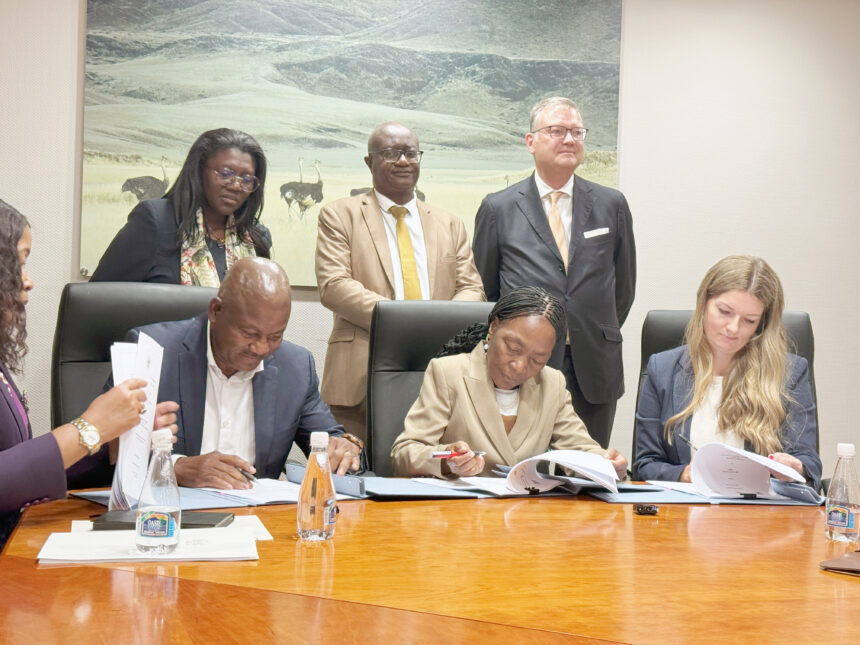In a landmark step toward enhancing national water security and resilience, government, the Namibia Water Corporation (NamWater) and the German Development Bank (KfW) on Tuesday signed a N$1.5 billion (EUR75 million) concessional loan agreement to fund the second phase of the Namibia Water Sector Support Programme (WSSP II).
The agreement was officially signed by finance minister Ericah Shafudah, Namwater CEO Abraham Nehemia and a representative of KfW, with the German ambassador to Namibia Thorsten Hutter in attendance.
The agreement marks a critical step forward in securing Namibia’s long-term water supply.
Shafudah highlighted the importance of the concessional loan in complementing national budget efforts.
“This concessional loan agreement reflects Namibia’s commitment to finding innovative ways to fund critical infrastructure.
With a favourable interest rate of 10.09% below local market rates by 2.3% and a 20-year repayment period with a five-year grace, it allows us to address urgent water challenges beyond the limits of the national budget. As I stated in my maiden budget, not all priorities will be funded through the budget alone.
“We are leveraging partnerships to deliver real impact for our people. Implementation of these projects will significantly improve water accessibility for our people, thereby contributing meaningfully to our national development agenda,” she stated.
This strategic investment represents a significant milestone in the country’s effort to ensure a sustainable water future.
The funding will be used to construct and rehabilitate essential bulk water infrastructure, particularly in the Central-North and North-Eastern regions.
As one of the driest countries in Sub-Saharan Africa, Namibia continues to face growing pressure on its water resources due to persistent droughts and climate variability.
Robust and resilient water infrastructure is urgently needed to meet rising demand and protect livelihoods across the country.
WSSP II will focus on reducing water losses, expanding access to clean water and strengthening sustainable water management practices.
Priority areas include the rehabilitation and expansion of bulk water supply infrastructure, upgraded pipelines, reservoir systems as well as the introduction of small-scale desalination technologies in hard-hit rural communities.
A flagship initiative under this programme is the Omundaungilo–Omutsegwonime Bulk Pipeline Scheme.
This transformative project will see the construction of approximately 130 kilometres of new water pipelines, development of production boreholes and wellfields, construction of reservoirs, booster stations as well as water treatment facilities.
The project will bring potable water to over 27 000 people in the Ohangwena and Oshikoto regions, greatly improving quality of life, public health and economic activity in the affected areas.
Additional interventions under WSSP II include alleviating supply constraints along the Oshakati-Ondangwa-Oshali-Omuthiya-Omutsegwonime pipeline corridor (Phases 1 and 2).
Moreover, it entails installing compact desalination units to treat saline groundwater in remote locations in collaboration with the agriculture, water, fisheries and land reform ministry.
Finally, it includes enhancing climate resilience by modernising water infrastructure and reducing water losses. German ambassador Hutter praised Namibia’s commitment to sustainable water development.
He said “these projects will not only improve Namibia’s resilience to droughts, but also foster a more secure and inclusive water future for the country”.
Nehemia described the agreement as a defining moment in national infrastructure development.
“This €75 million loan is not just funding. It’s a transformative investment in the future of water security for Namibia. It empowers us to act decisively in bridging the water access divide, particularly in underserved northern regions.
“As NamWater, we are ready to deliver swiftly, professionally and with a deep sense of national responsibility. Every pipeline we lay and every treatment unit we install brings us closer to a future where every Namibian enjoys their right to clean, reliable water,” said the NamWater CEO.
This investment underscores the shared commitment between the Namibian government, the Federal Republic of Germany and KfW to address climate resilience and sustainable resources’ management.
In addition, it reflects a growing global consensus that access to safe and reliable water is not only essential for public health and dignity, but also for economic growth and climate adaptation. Through WSSP II, Namibia is laying the groundwork for a future in which no one is left behind.



